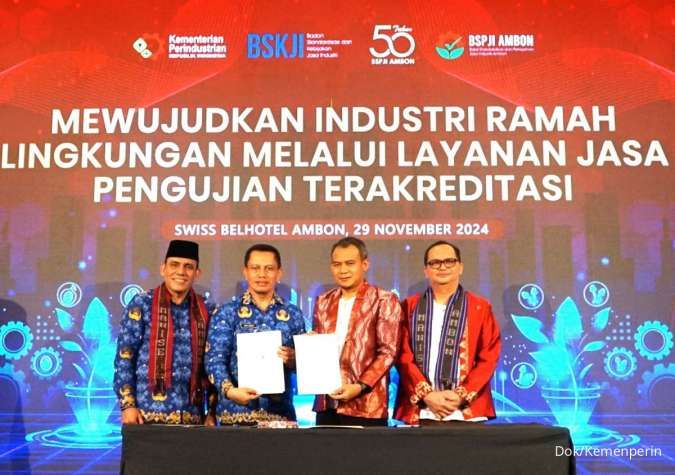News
BSKJI Ambon presents accredited lab for testing
WINDONESIA December 5, 2024 (Industry Ministry)
(Industry Ministry)
The manufacturing sector plays a significant role in supporting the economic growth of Maluku Province, with it experiencing the largest growth at 11.63 percent year-on-year (yoy) compared to other economic sectors in the third quarter of 2024. Thanks to the sector's contribution, the province's economy grew by 6.23 percent yoy to Rp15.96 trillion.
"We hope that industrial players in the Maluku region can continue to support the direction of government policy through the creation of added value and the growth of industries based on biological resources by utilizing the diverse natural resources in Maluku. That would be in line with the downstream and industrialization policies initiated by the [central] government," Industry Ministry Industrial Services Standardization and Policy Agency (BSKJI) Head Andi Rizaldi stated on Dec. 3, 2024.
Andi said that the government has issued the National Long-Term Development Plan (RPJPN) for 2025-2045, a guideline for all government and non-government development actors in accordance with their respective roles and functions to achieve the Golden Indonesia 2045 Vision.
"The RPJPN has mapped out the direction of national [and] regional development. The development of the Maluku region for the next 20 years is targeted to achieve becoming the Eastern Indonesian Maritime Hub through the utilization of marine resources while continuing to optimize other resources based on sustainable principles," he explained.
Andi also said that, in line with the current world trend towards green products and the requirements for implementing sustainable practices by several export destination countries such as the Carbon Border Adjustment Mechanism (CBAM) in the European Union, the Industry Ministry continues to encourage the implementation of green industry policies.
Green industry is an industry with its production process directed to carry out efficient use of resources in a sustainable manner so as to maintain environmental sustainability and provide a positive impact on society. Green industry could be implemented for increasing resource efficiency, creating green products with environmentally friendly raw materials, utilizing clean energy, reducing emissions as well as controlling toxic and hazardous (B3) waste, using sustainable standards, and implementing a circular economy.
In order to support the sustainability of the industrial sector in the Maluku region, the Industry Ministry through the Technical Implementation Unit (UPT) under the guidance of BSKJI. It is ready to provide industrial services related to decarbonization of the industrial sector and increasing industrial competitiveness.
"Services to support the decarbonization of the industrial sector include verification and validation of greenhouse gas emissions, green industry certification, as well as consulting and technical guidance related to green industry," Andi said.
Meanwhile, services related to increasing industrial competitiveness are local content requirement (TKDN), verification, technology and energy audits, as well as environmental testing. One of the superior services owned by BSPJI Ambon in supporting sustainability is the provision of accredited air quality, work environment, and water quality testing services as well as wastewater testing.
To introduce its superior service, some time ago, BSPJI Ambon held a Customer Meeting with the theme "Realizing Environmentally Friendly Industry through Accredited Testing Services".
"The purpose of this customer meeting is to introduce the BSPJI Ambon environmental laboratory to industry players in Maluku with a laboratory that has been accredited and registered by the Environment and Forestry Ministry," BSPJI Ambon Head Soni Pitriajaya.
Soni emphasized that BSPJI Ambon as a government institution tasked with standardizing and testing industrial products, is committed to continuing to provide the best service to all customers from industry players.
"With accreditation, we are sure that the test results we provide can be scientifically accounted for and recognized nationally and internationally," he added.
Soni also hopes that through customer meetings, industry players could also increasingly understand the importance of conducting product testing to ensure the products' quality and safety.
"Through this testing, we can ensure that the products produced by the industry have met the applicable technical, safety, and environmental requirements," he concluded.

